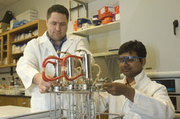Cuban-born professor Ramon Gonzalez and post-doc Syed Shams Yazdani have announced a way to turn glycerin into ethanol using a strain of E.Coli and intend to start commercial production next year.
Dr. Gonazalez has been focusing his research on using microbial agents as catalysts for chemical changes, and the press release on this went out in June.
It’s now getting the big build-up because DFJ Mercury, a Texas seed capital firm, is now funding the transformation of laboratory science into practical profit. Plus it’s another win for Rice in the War Against Oil.
Unlike a lot of Rice science, which may be many years or decades from
resulting in money-making ventures, this finding can be converted
readily into cash. The reason is that the biodiesel process creates glycerin as a by-product, and there’s an enormous glut of glycerin on the world market right now. So the feedstock for this energy product is practically free.
Glycerin itself had been a profitable product until the rise of
biodiesel. Companies which were formerly producing glycerin have
recently been shuttered, and so much is being produced that the
biodiesel guys can’t get rid of it. Dr. Gonzalez estimated that for
every 10 pounds of biodiesel being produced worldwide, 1 pound of
glycerin is produced. Turning that glycerin into ethanol not only
results in energy, but in a balanced market for glycerin as well.
The idea behind biological conversion is that a microorganism eats the
input and excretes the output, just a a yeast eats the sugars in grape
juice and excretes alcohol to make wine. The trick, Gonzalez wrote in
his article for the June issue of Current Opinion in Biotechnology, was
to find an organism that would digest glycerin in
an oxygen-free environment, known as anaerobic fermentation. The E.Coli
strain turned out to work, and the particular strain being used is not
the same as the one which makes you sick.
"We are confident that our
findings will enable the use of E. coli to anaerobically produce
ethanol and other products from glycerin with higher yields and lower
cost than can be obtained using common sugar-based feedstocks like
glucose and xylose," Gonzalez wrote.
And, Doc. If this leads on to fame and fortune, remember the annual fund. Burning $100 to light your Cohiba won’t be nearly as much fun as funding my son’s scholarship…












